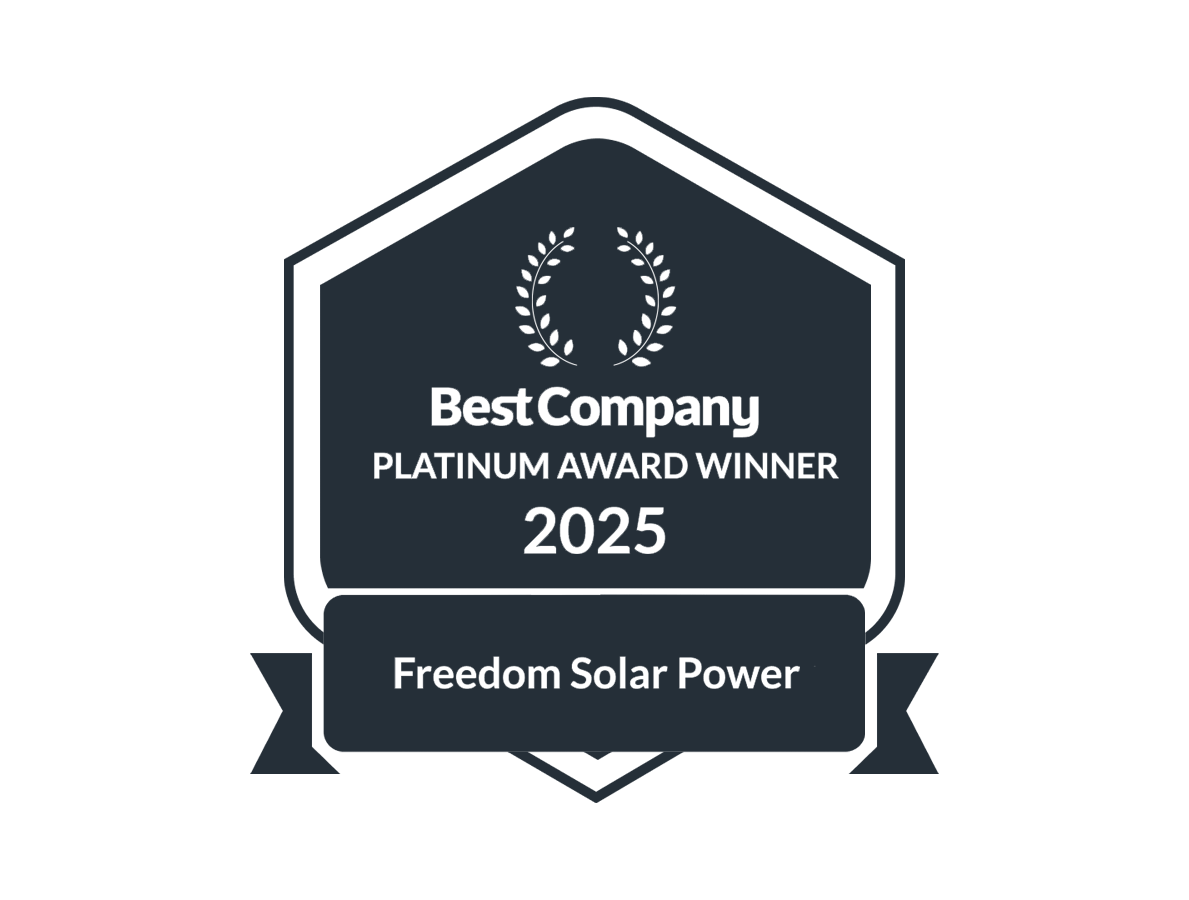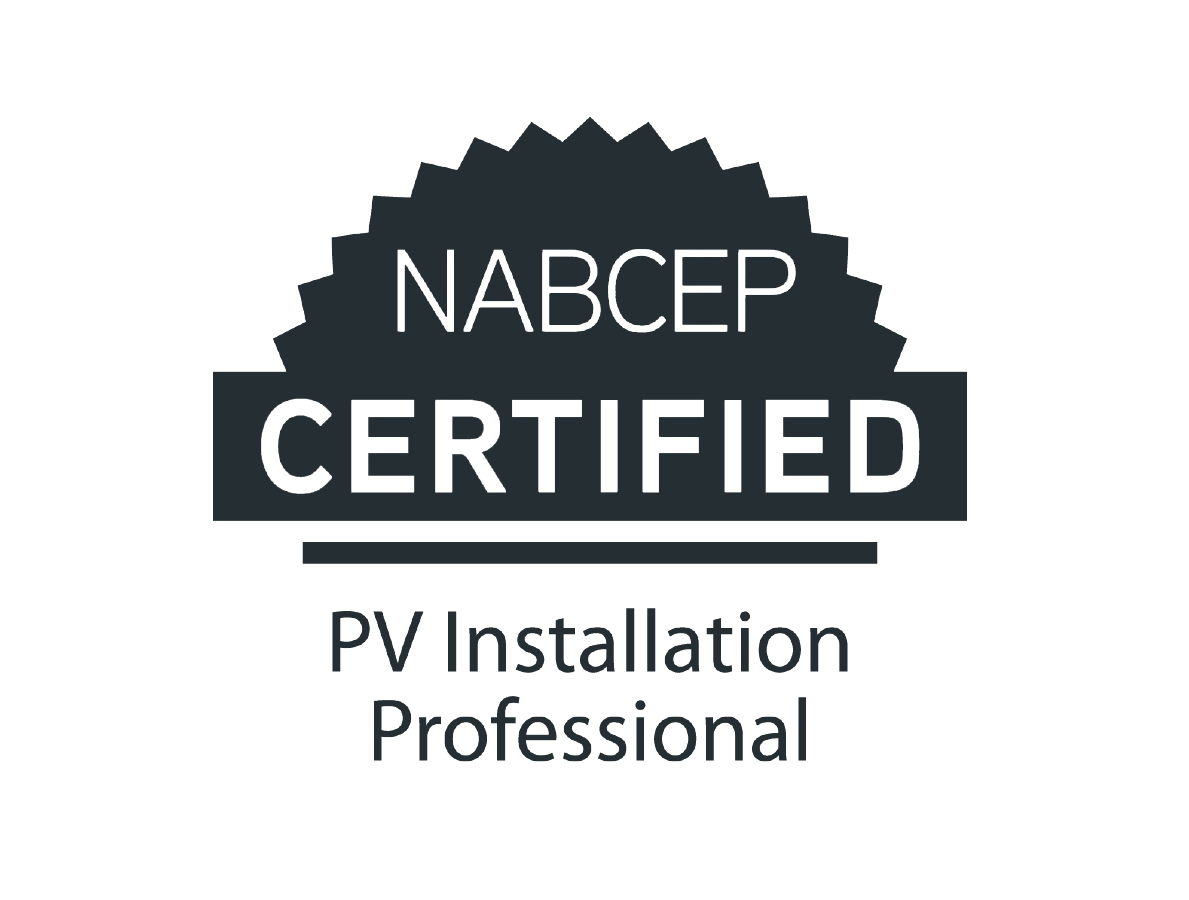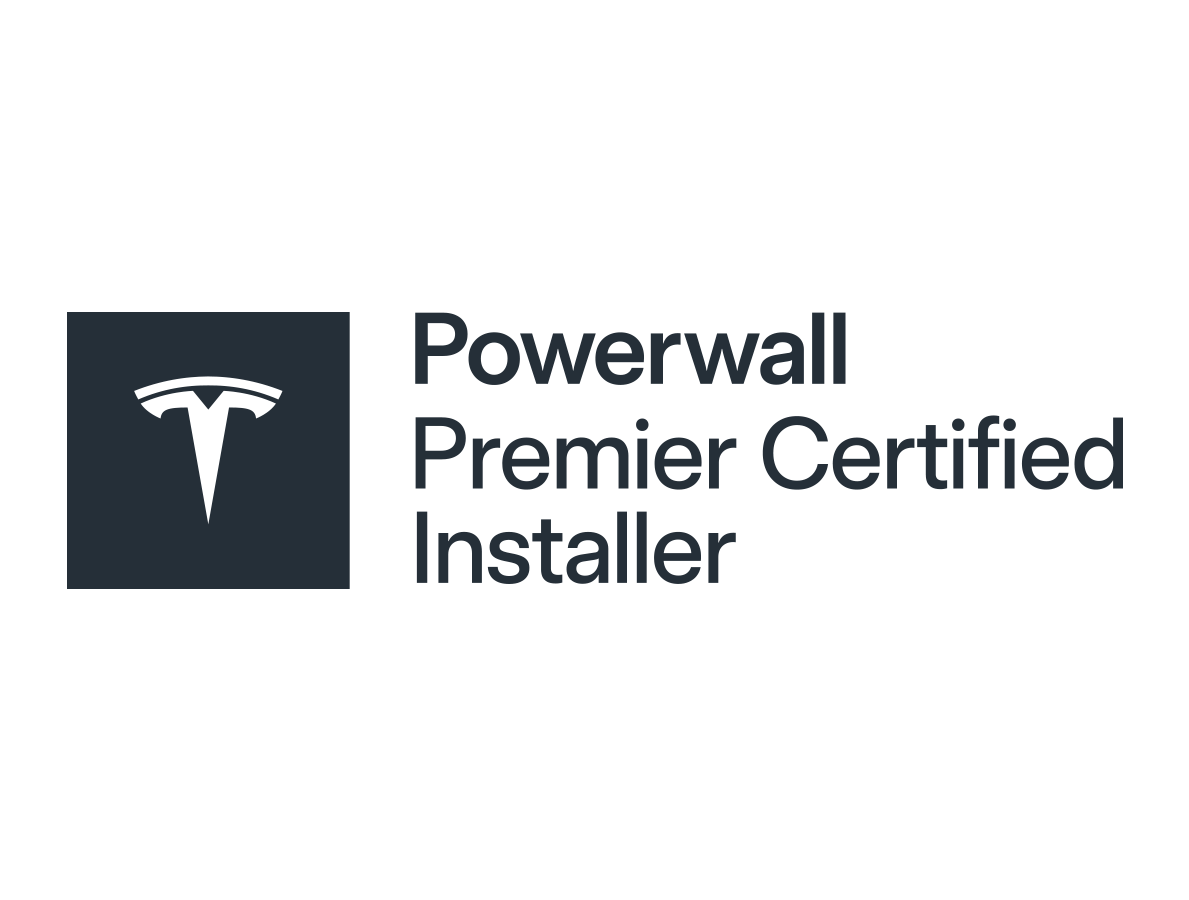Solar Power Installation
Power for the People
Claim $10,000* In Solar Tax Credits Before They End In 2025+
Go Solar for $0 Down and 0 Payments for 18 Months.** Let us help you claim your power.
The 30% Federal Tax Credit Could Be Canceled! Read More on How This Impacts You.
Solar Panels for Your Home, Built to Last
When your energy source is the sun, you have the liberty to use as much as you need, as often as you need it. We are here to put the power back in your hands. With over 24,000 systems installed and counting, we are the fifth largest national residential solar installer. We believe in standing by our craftsmanship, which is why we work with best-in-class solar panels and back all of our installs with a 25-year service warranty.
- We serve all roof types, plus ground mounts
- We are a Premier Certified Tesla Powerwall solar battery installer and also install Enphase IQ5 Battery 10C Systems
- We offer the best-in-class solar panels products including Maxeon, Qcells, and Mission Solar
Learn more about residential solar cost and savings.
TRUSTED BY













Solar Installation Experts
EXPERTISE UNDER ONE ROOF
We are capable of complex projects and can install solar on Spanish tile, standing seam metal, corrugated roofs, flat roofs, ground mount solar systems, and more. Here are a few of the recent projects we have completed.
Capri Blvd
- Location: Treasure Island, FL
- System Size: 8.295 kW system size
Reinsch Ranch
- Location: Smithville, TX
- System Size: 6.8 kW system size
King Ranch
- Location: Kingsville, TX
- System Size: 36.125 kW system size
COMMERCIAL SOLAR PANEL INSTALLATION
Hundreds of top companies partner with Freedom Solar Power to save money and natural resources with commercial solar power.
- Solar panels and backup power supply on ballasted, flat, TPO, and metal roofing, ground mount, parking structures
- Ideal industries for solar include healthcare, automotive, multifamily, climate-controlled storage, distributors, and manufacturers
- Many financing and leasing options to choose from
- We are the #1 installer of solar on auto dealerships in the U.S.
Learn more about commercial solar cost and savings.
We now offer HVAC Services in Austin, TX
FREEDOM HVAC is here! Book your $99 Air Conditioner tuneup for summer
THE BUCK STOPS HERE
We hold ourselves accountable and will bend over backwards to make sure we exceed your expectations. Our in-house service department is here for all of your residential and commercial solar energy needs.
- Full-time employees who are trained, certified, and licensed for the job
- Diagnostics, solar panel maintenance, system upgrades, monitoring, and manufacturer warranty replacements
- Service for any solar panel system, regardless of who installed it or what model it is
Hey! I’m Manny. I’ll get you a solar quote in seconds!
GET YOUR INSTANT SOLAR QUOTE
THE ORIGINAL SOLAR REVOLUTIONARIES
Our mission: To help every homeowner achieve energy freedom
We’ve been in the business since the industry started in 2007. We’ve now converted over 24,000 homeowners to solar power. Join our community of people who see a brighter way.
SOLAR IS SETTING PEOPLE FREE
Alvin Dedeaux
Fly fisherman, Alvin Dedeaux, chose Mission Solar for his family home to help get ahead of rising electricity costs in Austin, Texas, and because he’s a stickler for high-quality products.
Lyndsay & Leslie
HGTV designers, Lyndsay Lamb and Leslie Davis, installed Mission Solar panels to help increase the valuation of their Florida waterfront home when competing on HGTV’s “Rock the Block”.
Over 2,000 5-star reviews
I would also like to mention that our sales representative Brandon Edgley was very professional and patient with all my questions. He was able to get us in a price and loan we could afford.
Renee’s understanding of solar technology, the various financing options, and the available incentives was truly impressive. They took the time to clearly explain the different system choices and expertly guided me to select the best solution tailored to my specific requirements. I really appreciated that they were able to thoroughly answer all of my questions, no matter how detailed, which gave me a great deal of confidence in my final decision.
I am already seeing fantastic results, with an 80% reduction in my electric bill! My last bill was only $12. It's amazing to think I'm now investing in my own electricity production and gaining independence from traditional power companies – it truly feels like freedom.
Addition:
My system has been up and running and meeting all my expectations.
My only negative is that now the management system is "Suntrong" and they demand a $100.00 a year fee to monitor and manage my own system. If you can avoid the Sunpower or Sunstrong management box do so by all means. I hear Enphase does not require a fee.
The installation team is amazing and fast. They installed 42 solar panels on our roof. The electricians were phenomenal dealing with the electrical in our old house.
Freedom took care of everything, all the permits and inspections. Great experience overall working with everyone. Will highly recommend.
An awesome employee at freedom solar.
Will add another review after our system is up and running.
With that said, their customer support staff can be overly reliant on their software, and not listen to the customer when there is a problem. Some of their customer support staff were amazing and some were infuriatingly resistant to understanding that an issue needed to be addressed.
In the end, the installation went in within 9 months from the signing of the contract.
Spencer’s dedication to customer service was amazing. He was always available to address any concerns and ensured everything went smoothly. The installation team was efficient, and the final product looks fantastic. We couldn’t be happier with our decision to go solar and we highly recommend working with Spencer if you’re considering making the switch.
Thank you, Spencer and Freedom Solar, for a positive experience!
So far they work very good for me no problems, it's been a year with them.
Thank you freedum solars
His presentation was extremely professional and insightful, without being “ pushy “.
Since signing the contract, communication from Freedom Solar has been very timely, and questions were answered without delay.
After a nightmare contract with a Solar company that went out of business, and losing my deposit, I would highly recommend Freedom Solar.
Now, I'm working with the same team to install additional panels, and I'm happy to say that Jeffrey Winzenried, the original energy consultant who helped me a year ago, is assisting me through the process once again. He is a great person to work with, always available to answer questions and guide you through the process.
Individuals by team are listed below for reference. Ask for them
Solar: Michael Berg, Quantaun Bell,,Leonel Nana,Joshua Rodriguez,,Darian Lopez.
Electrical: Jacob Reyes, Jordon Torres, Chris Messick
Kyle M, Fort Worth, TX
Individuals by team are listed below for reference. Ask for them
Solar: Michael Berg, Quantaun Bell,,Leonel Nana,Joshua Rodriguez,,Darian Lopez.
Electrical: Jacob Reyes, Jordon Torres, Chris Messick
Alina was kind, Professional, detailed, knowledgeable, she was on top of her game. We appreciated Alina's assistance. We have already recommended her to our neighbors and will to others as well.
She really did listen because when she arrived, she had done some checking into our original install plan and agreed that it was not what should the final installation should have looked like. We talked then talked about what we were considering for a second phase (adding panels and batteries) and she asked if she could work up some options. In just a day or two she presented us with some options that were really just what we were looking for, and she said that she was sure that they could make the corrections to the original install when the second phase went up if we went forward. Her presentation was professional, and focused on us and not the pushing the most expensive option, and she had included the revisions to the original installation. We said “Let’s do it” and signed the contract.
When the design documents arrived and were not exactly what we had talked about (we thought here we go again) , we notified the designers and also notified Ms. Rose. She immediately stepped back into the equation and ensured that the communication issue we had at this phase was cleared up right away. We are now just about finished with the permitting approval phase and looking forward to the additional 29 panels and 2 Tesla Batteries being installed.
Bottom line is that Ms. Rose empathetically listened to our concerns, assured us that she would be in our corner every step of the way, and laid out a great slate of options for our consideration. Through her diligence and focus on getting it right, she singlehandedly brought us back to Freedom Solar Power for this 2d phase of our solar power system, and we can’t say enough positive things about her. She really is a teammate rather than a vender/sales rep and that is refreshing and something for her and her company to be proud of.
Pat and Debbie Caraway
Due to a poor experience with our prior solar system on our California home, when we began working with Freedom Solar in Texas, I went through the contract and other documentation with a fine tooth comb, asking Brandon countless questions on the system, installation, support, maintenance, et al.. Brandon was patient throughout, either answering the question directly or taking the time to research and provide an accurate answer versus trying to answer the question without the required knowledge. We greatly appreciated this support, which later led to a smooth implementation. Brandon was very professional, putting our understanding and support as priority one.
Through his support, we have had a trouble-free system, and our last four power bills were only for the hookup fee. We were pleased with this since this included the EV charging and ensuring Tesla 3 storage was charged going into the evening hours.
Freedom Solar Power did a great job and we highly recommend them. If you are in Northern Texas, we also recommend requesting Brandon to be your rep.
I found that generator companies are too covered up to handle all of the repairs. Most of them are not taking on new clients either.
Freedom Solar Power set up an appointment immediately and Sam Cochran evaluated my property right away for solar panels. This company and Sam are very professional and I recommend them if you are looking to go solar as a power backup.
After installation with couple of email communications there was a bit confusion about the next step in the process.
However, I was lucky to work with David Pleitez - and I took it to him with all my questions. Very patently answered all and clarified my doubts.
Based on my experience I recommend to work with David Pleitez @ Freedom solar
So I went ahead and decided to reach back out to them to add batteries.(1 Tesla Powerwall 3 and 1 Tesla Expansion pack)
On the day of installation Faviel Duron and Luke Jubiter were punctual and very professional. Faviel explained where the batteries will go and explained the installation process.
Once the installation was as done, he took the time to walk me through the Tesla app and its functionality .
I am very satisfied with the support and work that Freedom Solar provided and happy that everything is working as promised. Thank you 🙏
Highly recommended Freedom Solar Power and will definitely do business with them again.
The initial price with a nice warranty helped me decide to choose over a few competitors, but the customer service sells itself. I received amazing onboarding to implementation guidance, the ebbs and flow with my detach/reattach. Most recently provided guidance with me purchasing my Powerwall and even helped me pick the best electric plan to help reduce my usage and properly plan for outages. There are many folks on the CS/Support side of the house over the years but the most recent name that comes to mind is Silvana Escalante because she helped me calibrate my Powerwall with my energy company for best utilization down to how to program the operational mode. Do you want solid ROI investing in a solar company? Freedom Solar is worth the investment and you’ll see it Day 1
Good work 👏 🙌 👍 all.
Scott Scannell
From initial consult to a year after install (so far): Thorough, professional, easy to monitor. Have lost power multiple times since installed, but wouldn't know except we get a notification! Overall--the perfect backup for Texas ERCOT. We have not had any servicing yet, but I'm sure that will be amazing as well.
Very friendly and professional installation crew. Showed up on time and explained the complete process...very patient with my questions and concerns.
Thank you:
Jose Vina
Rob Perez
Joran Stokes
Chris Messick
Jason and Delys Rasmussen
We were still not sold on solar and decided to hold off. Fast forward 2 years and we took another look at solar and we found the business card of Freedom Solar Power's representative Michelle Nicholson. We remembered how straight forward her presentation had been. She was open and transparent about her company and its products, pros and cons and the home solar industry itself. Contacted Michelle to get up to date info and moved forward pretty quickly. FSP had already used aerial photos of our property. Their design team put together a plan for the solar panels on our roof. Upon approval and contracting with them their installation crew was very efficient with their time in putting on the panels and the batteries. Their electricians came next and went over the system with me while he activated the system. All the while these things were going on we were kept informed my email or phone by FSP and Michelle who always kept us up to speed on the process which went smoothly.
After installation we quickly enrolled in an electric company we had chosen and as had been recommended by Michelle because of pricing and rebates that were available. We have been producing electricity for several months now and our electricity bill has plummeted. A lot of what's on our now $30 electric bill is for charges other than electricity. Many times we have been able to sell electricity back to the grid even after the batteries are full. We are hopeful that after a year we will see that we are zeroing out our old electric bill.
One of my biggest concerns with going solar was, Who would be there to repair the system?.The only problem we have had is that we woke up one morning to a loud shrill sound. The panels had been active about a month without issue. The noise was easily traced to the FSP electrical panel. We shut the panels etc off. Our first thought was to call Michelle. She gave us the number to their maintenance department, which I think we already had. FSP Maintenance were quick to diagnose the problem and assure us that everything was safe and that a tech would be out asap to fix the problem. Later the same day I received a call from the Tech who told me he was enroute and should be able to fix the problem. The tech was very courteous and remedied the problem quickly and turned the system back on. We chose FSP because from our viewpoint everyone we dealt with was and has been very professional, very knowledgeable about their product and services and took pride in their work and their company.
I shopped around multiple companies and even considered doing a self install. In the end I settled on Freedom Solar and I am glad I did. I feel confident I got a fair price for a quality system and the service was basically hands off with them taking care of everything leaving me with 0 headaches or problems that would have been inevitable if I had done the work myself or that I have read about in reviews of other solar companies.
Jessica gave us a one year follow-up call to check on our system, and she was outstanding.
We are very happy with our system.
I shopped around multiple companies and even considered doing a self install. In the end I settled on Freedom Solar and I am glad I did. I feel confident I got a fair price for a quality system and the service was basically hands off with them taking care of everything leaving me with 0 headaches or problems that would have been inevitable if I had done the work myself or that I have read about in reviews of other solar companies.
I chose Freedom Solar initially because they use SunPower panels which are very efficient. I was not happy with the original monitoring app, but it is much improved with the current version. Jorge is the man!
Found out they do everything in house, even make their panels in the USA!!
Highly recommend this company! Very professional and informative!
Robert is a true leader—knowledgeable, communicative, and dedicated to getting the job done right. His team worked seamlessly together, showing incredible attention to detail and craftsmanship. They arrived on time, worked efficiently, and left everything spotless when they were finished. It’s clear that they take great pride in their work, and it shows in the quality of the installation.
Beyond their technical skills, the Solar Goats were friendly, respectful, and happy to answer all of our questions. They made the entire process smooth and stress-free, ensuring we understood everything about our new solar system.
If you’re considering going solar, I highly recommend requesting Robert and the Solar Goats—they are the best in the business! Thank you, team, for your hard work and dedication to making our home energy-efficient!
⭐️⭐️⭐️⭐️⭐️
Amazing businessman and I will actually refer to many many of my friends who are also going to do solar as well as myself when I move to my new place.
Good work 👏 🙌 👍 all.
I would recommend Freedom Solar to anyone who is in the market for solar panel installation.
Maintained communication prior to arrival and arrived right on time. Everyone was very courteous. The install itself was very efficient, neat and tidy.
We noticed one corner raised on the edge and will let them know. I am confident they will come back and address it.
Update: The panel was fixed within the next week.
Our system has been live for over a month now and we are definitely seeing the benefits of going solar. Michelle Nicholson is our point of contact with Freedom Solar and has been very responsive to all of our questions (which I am sure she has heard a million times!). We could not have had a better person guide us through this journey!
When we encountered an issue, he made sure we received the support we needed at every step, guiding us through with patience and dedication. He has even taken the time to "fine tune" our setup and analyze our output to take advantage of how much power we're generating. Pointing out the optimal times to use major appliances.
It's rare to find someone as pleasant and committed as Cristjo, and we are incredibly grateful for his excellent service.
We highly recommend!
Len & Madeline Ross
Missouri City, TX
We are so happy with the system
Thank you 🙏🏼
Right now, just waiting for approval from HOA, electric company and the City.
First off, Brandon, the sales representative, was exceptional. He was very knowledgeable and took the time to thoroughly explain the entire process, from the technical aspects of the system to the financial savings. He helped me understand the incentives available and made sure I felt comfortable with every decision. There was never any pressure, just clear, honest information, which I really appreciated.
Once I signed on, the installation team from Freedom Solar came out and got the system up and running. The crew was punctual, professional, and incredibly efficient. They took care of everything, including permits and inspections, and ensured the setup was perfect. The entire installation was done within the timeline they promised, and they made sure to clean up after themselves.
Now that my system is up and running, I’ve already noticed a reduction in my energy bills, and the peace of mind knowing I’m using clean, renewable energy feels great.
I would highly recommend Freedom Solar to anyone considering solar power, and if you’re working with Brandon, you’re in excellent hands!
Want to know more?
Begin a FREE Consultation.
- Send us your info.
- We’ll contact you to schedule an appointment.
- An energy consultant will meet with you at your home, place of business or virtually.
- You will get a custom proposal with system size, design, costs, financing, and savings.